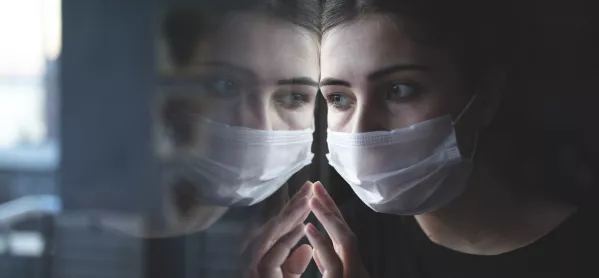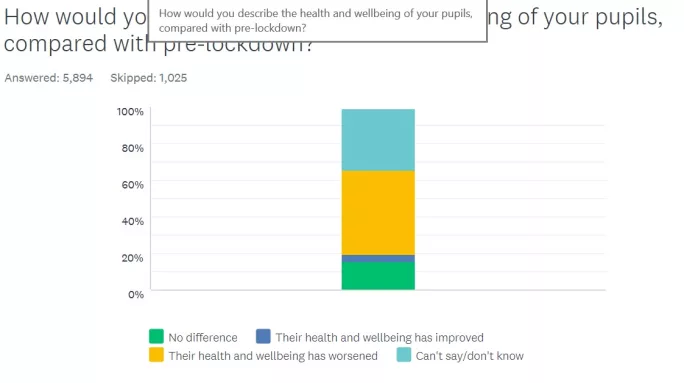- Home
- Revealed: Pupil angst, alopecia and obesity under Covid
Revealed: Pupil angst, alopecia and obesity under Covid

Teachers’ fears about the declining state of pupils’ physical and mental health during the pandemic have been laid bare in a survey by Tes.
Pupil anxiety and weight gain are two of the major problems highlighted in the survey of nearly 6,000 school staff in England, including teachers, heads and teaching assistants.
Respondents said that some pupils “haven’t left the house for months”, some have “vegetated on their games consoles” and some Year 10 and 12 students are “frightened and struggling” and could not understand work sent home last term.
When asked “How would you describe the health and wellbeing of your pupils, compared with pre-lockdown?” nearly half - 46 per cent - of respondents said it had “worsened”.
Of the remainder, 34 per cent replied “can’t say/don’t know”, while 15 per cent said there had been no difference and just 4 per cent said pupils’ health and wellbeing had improved.
Findings from the survey, carried out earlier this month, have fuelled calls for NHS-funded counsellors in every school.
Exclusive: DfE ‘must do more to tackle learning chasm’
Pupil wellbeing: Why lessons in healthy eating will never work
WATCH: Teachers get ‘reality check’ on returning pupils
Exclusive: Covid-19 ‘widens achievement gap to a gulf’
Some teachers painted a particularly bleak picture. One said: “Some children have actively benefited from lockdown, others have been forced into domestic nightmares and some have become so depressed they have killed themselves.”
Coronavirus: Fears over pupil mental health and wellbeing
Another said: “One child in our Year 5 class has suffered significantly. His father is shielding, the family have not been outside their family home (with a garden) since before lockdown. The child’s father has told me the pupil’s hair has fallen out in clumps and they have now had to shave it.”

Robert Halfon, chair of the Commons’ Education Select Committee, said he was not surprised by the results of the Tes survey. He said: “The lockdown has been a national disaster for left-behind children and we’ve potentially got an epidemic of educational poverty, a safeguarding crisis and a mental health disaster in the offing.”
One respondent said: “Some have had an awful few months” but “the real impact will only be seen once we are all back in September.
Another said: “Overweight children [have had] no demands put on them so [they’re] happy, but when demands are put on to them, outbursts may occur with children with SEND.”
And there was also concern about the health and wellbeing of next year’s GCSE and A-level candidates. One teacher said: “There is an anxiety among my exam students (Year 10 and 12) about work, and KS3 students have more general social anxiety.”
Another added: “I have had emails from Year 10 and 12 who are struggling and frightened about missing out and not understanding work that has been set.”
Anne Longfield, children’s commissioner for England, also commenting on the Tes survey, saying that the government should recognise the impact of lockdown on children’s mental health and commit to an NHS-funded counsellor in every school.
“The sacrifices made by children during the lockdown have been enormous and the impact on the many of the most vulnerable children will have been considerable,” she said.
A Department for Education spokesperson said the government recognised the impact that the pandemic has had “not just on children’s mental health but also their parents and families”, and was investing £9.2 million in mental health charities to support all those affected. Advice had been provided to parents on how to look after their own wellbeing as well as their children’s.
The spokesperson continued: “Ahead of the full return [of schools] in September, we are providing new online resources, designed by experts, to help school and college staff talk more confidently with their pupils about the anxieties and concerns they feel at this time.”
Register with Tes and you can read two free articles every month plus you'll have access to our range of award-winning newsletters.
Keep reading with our special offer!
You’ve reached your limit of free articles this month.
- Unlimited access to all Tes magazine content
- Save your favourite articles and gift them to your colleagues
- Exclusive subscriber-only stories
- Over 200,000 archived articles
- Unlimited access to all Tes magazine content
- Save your favourite articles and gift them to your colleagues
- Exclusive subscriber-only stories
- Over 200,000 archived articles



